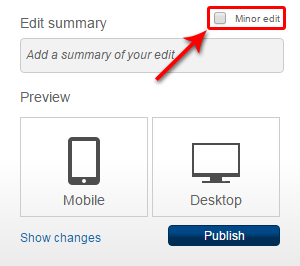(Added image of minor edit checkbox on UCP.) |
|||
| (42 intermediate revisions by 36 users not shown) | |||
| Line 1: | Line 1: | ||
| − | [[File:MinorEdit.png| |
+ | [[File:MinorEdit.png|frame|250px|In all editors, you can mark an edit as minor by checking the minor edit box in the edit summary field. Shown here is the way it looks in [[help:source edit mode|source]] and the [[help:classic editor|classic editor]] on the legacy platform.]] |
| + | [[File:Minor edit on UCP.jpg|thumb|300px|On [[Help:UCP|UCP]] wikis, the button is in a slightly different place.]] |
||
| − | A check to the '''minor edit''' box is intended to signify that only superficial differences exist between the current and previous version: typo fixes, formatting, or otherwise rearranging text without changing content. A minor edit is a version that the editor believes requires no review and could never be the subject of a dispute. |
||
| + | It's a good idea to check the '''minor edit''' box whenever you make an edit that doesn't affect the overall meaning of a page. |
||
| − | By contrast, a major edit is a version that should be reviewed by other editors to ensure that everyone agrees on the change. Therefore, any change that affects the ''meaning'' of an article is not minor, even if the edit is a single word. |
||
| + | Edits which correct typos, add formatting, or simply rearrange text don't usually require community review. By marking them as minor, you allow your fellow editors to suppress them in the [[help:page history|page history]] and [[:special:recentchanges|recent changes list]]. This allows others to focus their attention on more substantial edits. |
||
| − | The distinction between major and minor edits is significant because editors may choose to ignore minor edits when reviewing [[Help:recent changes|recent changes]]; logged-in users might even set their preferences to not display them. If you think there is any chance that another editor might dispute your change, please do not mark it as minor. |
||
| + | Knowing when to call an edit "minor", and marking your edits ''correctly'', can help avoid conflict with your fellow editors. Almost every community on Fandom will appreciate you labelling a spot of spellchecking as "minor" — and frown if you do the same when you add five new paragraphs. |
||
| − | An edit marked as minor is signified with a bolded "m" character ('''m''') in the [[Help:Page history|page history]]. Minor edits will also appear with the same bolded "m" in [[:Special:RecentChanges]]. |
||
| − | ==When should I mark an edit as minor?== |
+ | == When should I mark an edit as minor? == |
| + | {{TOCright}} |
||
* Spelling corrections |
* Spelling corrections |
||
| − | * Simple formatting or grammar correction ( |
+ | * Simple formatting or grammar correction (capitalization, etc.) |
* Formatting that doesn't change the meaning of the page (e.g. bolding text, splitting one paragraph into two) |
* Formatting that doesn't change the meaning of the page (e.g. bolding text, splitting one paragraph into two) |
||
| − | * Obvious factual errors (changing ''The Beatles' 1866 album'' to ''The Beatles' 1966 album'') |
+ | * Obvious factual errors (e.g. changing ''The Beatles' 1866 album'' to ''The Beatles' 1966 album'') |
| − | * Fixing layout errors (e.g. |
+ | * Fixing layout errors (e.g. changing <code><nowiki>{template name here}</nowiki></code> to <code><nowiki>{{template name here}}</nowiki></code> |
| − | * Adding and correcting wiki links or categories (e.g changing <nowiki>[[ |
+ | * Adding and correcting wiki links or categories (e.g changing <code><nowiki>[[Esample]]</nowiki></code> to <code><nowiki>[[Example]]</nowiki></code>) |
| − | * Removing vandalism and graffiti |
+ | * Removing [[Help:Vandalism|vandalism]] and graffiti |
| − | ===Things to remember=== |
+ | === Things to remember === |
| − | * Any change to the source text ([[Help:Wikitext| |
+ | * Any change to the source text ([[Help:Wikitext|wikitext]]), even if it does not affect the presentation of the page in [[Help:HTML|HTML]], will still be treated as a change according to the database. So if you add a space or a line break, you'll generate an entry in the page history. Such cases are excellent examples of minor edits. |
| − | * Marking a major change as a minor one is considered poor etiquette, especially if the change involves the deletion of some text. |
+ | * Marking a major change as a minor one is considered poor etiquette, especially if the change involves the deletion of some text. Avoid marking an edit "minor" if it would be reasonable for another editor to consider your edit "major". |
| + | * If your preferences allow you to see minor edits, they'll appear in both of these lists with a bolded "m" character ('''m''') next to them. |
||
* [[Help:Reverting|Reverting]] a page is not likely to be considered minor under most circumstances. When the status of a page is disputed, and particularly if an edit war is brewing, then it is better not to mark ''any'' edit as minor. Reverting blatant vandalism is an exception to this rule. |
* [[Help:Reverting|Reverting]] a page is not likely to be considered minor under most circumstances. When the status of a page is disputed, and particularly if an edit war is brewing, then it is better not to mark ''any'' edit as minor. Reverting blatant vandalism is an exception to this rule. |
||
| − | ==Who can mark an edit as minor?== |
+ | == Who can mark an edit as minor? == |
| − | Users who are not [[Help: |
+ | Users who are not [[Help:Logging in|logged into]] Fandom are unable to mark changes as minor because of the potential for vandalism. The ability to mark changes as minor is [[Help:Create an account|another reason to register]]. |
| − | An administrator |
+ | An administrator or a user with [[Help:User rights#Rollback|rollback]] rights can semi-automatically revert the edits of the last editor of a page; all such "rollback" revisions are marked as minor by the software. This is because the ''cumulative'' effect of the edits and the rollback is zero changes. The intended use of the rollback feature is for cases of vandalism, where the act of reverting any vandalism should be considered minor (and can be ignored in the recent changes list). |
| ⚫ | |||
| − | The intended use of the rollback feature is for cases of vandalism, where the act of reverting any vandalism should be considered minor (and can be ignored in the recent changes list). This has the undesirable effect that if preferences have been set to hide minor edits, and an undesirable edit has not been marked minor, one sees that, but not a possible semi-automatic reversion, in Recent Changes and Enhanced Recent Changes. |
||
| ⚫ | |||
| − | |||
| ⚫ | |||
| ⚫ | |||
| ⚫ | |||
| ⚫ | |||
| + | == Further help and feedback == |
||
| + | {{Help and feedback section}} |
||
| ⚫ | |||
| + | [[fi:Ohje:Pieni muutos]] |
||
| + | [[fr:Aide:Modification mineure]] |
||
| + | [[it:Aiuto:Modifica minore]] |
||
| + | [[ja:ヘルプ:小規模な編集]] |
||
| ⚫ | |||
| ⚫ | |||
| + | [[pt:Ajuda:Edição menor]] |
||
| + | [[ru:Справка:Малая правка]] |
||
| + | [[tr:Yardım:Küçük düzenleme]] |
||
| + | [[vi:Trợ giúp:Sửa đổi nhỏ]] |
||
| + | [[zh:Help:小編輯]] |
||
[[Category:Editing]] |
[[Category:Editing]] |
||
[[Category:Help|{{PAGENAME}}]] |
[[Category:Help|{{PAGENAME}}]] |
||
| − | |||
| ⚫ | |||
| ⚫ | |||
| − | |||
| ⚫ | |||
Revision as of 23:30, 2 September 2020

In all editors, you can mark an edit as minor by checking the minor edit box in the edit summary field. Shown here is the way it looks in source and the classic editor on the legacy platform.

On UCP wikis, the button is in a slightly different place.
It's a good idea to check the minor edit box whenever you make an edit that doesn't affect the overall meaning of a page.
Edits which correct typos, add formatting, or simply rearrange text don't usually require community review. By marking them as minor, you allow your fellow editors to suppress them in the page history and recent changes list. This allows others to focus their attention on more substantial edits.
Knowing when to call an edit "minor", and marking your edits correctly, can help avoid conflict with your fellow editors. Almost every community on Fandom will appreciate you labelling a spot of spellchecking as "minor" — and frown if you do the same when you add five new paragraphs.
When should I mark an edit as minor?
- Spelling corrections
- Simple formatting or grammar correction (capitalization, etc.)
- Formatting that doesn't change the meaning of the page (e.g. bolding text, splitting one paragraph into two)
- Obvious factual errors (e.g. changing The Beatles' 1866 album to The Beatles' 1966 album)
- Fixing layout errors (e.g. changing
{template name here}to{{template name here}} - Adding and correcting wiki links or categories (e.g changing
[[Esample]]to[[Example]]) - Removing vandalism and graffiti
Things to remember
- Any change to the source text (wikitext), even if it does not affect the presentation of the page in HTML, will still be treated as a change according to the database. So if you add a space or a line break, you'll generate an entry in the page history. Such cases are excellent examples of minor edits.
- Marking a major change as a minor one is considered poor etiquette, especially if the change involves the deletion of some text. Avoid marking an edit "minor" if it would be reasonable for another editor to consider your edit "major".
- If your preferences allow you to see minor edits, they'll appear in both of these lists with a bolded "m" character (m) next to them.
- Reverting a page is not likely to be considered minor under most circumstances. When the status of a page is disputed, and particularly if an edit war is brewing, then it is better not to mark any edit as minor. Reverting blatant vandalism is an exception to this rule.
Who can mark an edit as minor?
Users who are not logged into Fandom are unable to mark changes as minor because of the potential for vandalism. The ability to mark changes as minor is another reason to register.
An administrator or a user with rollback rights can semi-automatically revert the edits of the last editor of a page; all such "rollback" revisions are marked as minor by the software. This is because the cumulative effect of the edits and the rollback is zero changes. The intended use of the rollback feature is for cases of vandalism, where the act of reverting any vandalism should be considered minor (and can be ignored in the recent changes list).
See also
Further help and feedback
- Browse and search other help pages at Help:Contents
- Check Fandom Community Central for sources of further help and support
- Check Contacting Fandom for how to report any errors or unclear steps in this article
